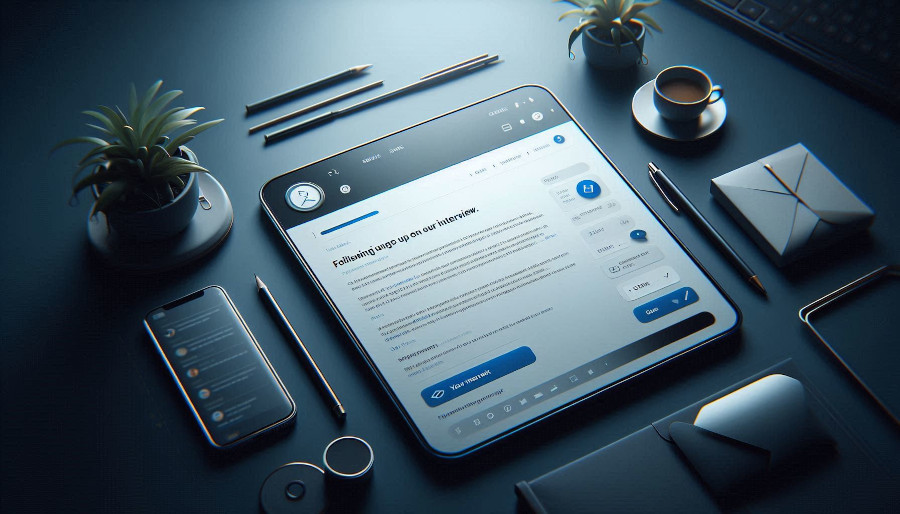The Power of the Follow-Up Email After an Interview
-
 Mark Dewan
Mark Dewan - 22 Jan, 2024

The Power of the Follow-Up Email After an Interview
In today’s competitive job market, a well-crafted follow-up email can significantly increase your chances of landing your dream job. By sending a timely and impactful follow-up email, you can reinforce your interest, address any unanswered questions, and leave a lasting impression on the hiring manager. Before you even get to the follow-up, make sure you ace your job interview.
Why Follow-Up Emails Matter
- Reinforce Your Interest: A follow-up email demonstrates your continued interest in the position and the company.
- Address Unanswered Questions: Use the email to clarify any points or questions that weren’t addressed during the interview.
- Provide Additional Information: Share any additional information or qualifications that weren’t mentioned during the interview.
- Express Gratitude: Thank the interviewer for their time and consideration.
- Stand Out from the Competition: A well-written follow-up email can differentiate you from other candidates.
When to Send a Follow-Up Email
The optimal time to send a follow-up email depends on the specific circumstances of the interview. However, generally, it’s best to send a follow-up email within 24-48 hours after the interview. This timely response shows your enthusiasm and initiative.
How to Write an Effective Follow-Up Email
1. Subject Line:
- Keep it concise and informative.
- Use a strong subject line that grabs the reader’s attention.
- Example: “Following up on [Job Title] Interview” or “Re: [Job Title] Interview”
2. Opening Paragraph:
- Thank the interviewer for their time and consideration.
- Briefly reiterate your interest in the position and the company.
- Reference a specific detail from the interview to show that you were paying attention.
3. Body Paragraph:
- Address any unanswered questions or concerns.
- Highlight any additional qualifications or experiences that make you a strong candidate.
- Express your enthusiasm for the opportunity and reiterate your interest in the company.
4. Closing Paragraph:
- Thank the interviewer again for their time.
- Reiterate your interest in the position.
- Provide your contact information and offer to answer any further questions.
5. Closing Salutation:
- Use a professional closing, such as “Sincerely,” “Best regards,” or “Thank you.”
Follow-Up Email Template
Dear [Interviewer's Name],
Thank you for taking the time to interview me for the [Job Title] position on [Date]. I enjoyed learning more about the role and the company, and I'm even more excited about the opportunity to contribute to [Company Name].
During our conversation, we discussed [Specific topic from the interview]. I wanted to further elaborate on my experience with [Relevant skill or experience]. [Provide additional details or examples].
I'm eager to learn more about the next steps in the hiring process. Please don't hesitate to contact me if you have any further questions.
Thank you again for your time and consideration.
Sincerely,
[Your Name]
[Your Phone Number]
[Your Email Address]
Additional Tips for Writing Effective Follow-Up Emails
- Keep it concise and professional.
- Proofread carefully to avoid errors.
- Use a professional email address and signature.
- Tailor your email to the specific job and interviewer.
- Avoid sounding desperate or pushy.
- Follow up with a phone call if necessary.
Common Mistakes to Avoid
- Sending a follow-up email too soon or too late.
- Writing a generic or overly formal email.
- Sounding desperate or needy.
- Focusing too much on yourself.
- Forgetting to proofread.
Conclusion
A well-crafted follow-up email can significantly increase your chances of landing your dream job. By following these tips and using the provided template, you can create a compelling follow-up email that leaves a lasting impression on the hiring manager. Remember, persistence and professionalism are key to a successful job search. Once you get the offer, be prepared for negotiating your job offer.
Useful Resources:
- LinkedIn: https://www.linkedin.com/
- Glassdoor: https://www.glassdoor.com/index.htm
- Indeed: https://www.ziprecruiter.com/
- CareerBuilder: https://www.careerbuilder.com/
By following these guidelines and leveraging the power of the follow-up email, you can take your job search to the next level and achieve your career goals.

